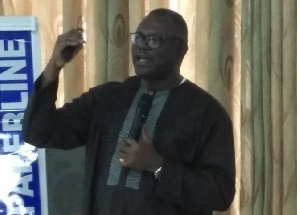 Abdallah Ali-Nakyea is an expert in Tax Governance
Abdallah Ali-Nakyea is an expert in Tax Governance
To ensure transparency, accountability and proper fiscal management of mineral revenues, there has been a renewed proposal for a comprehensive mineral revenue law similar to the Petroleum Revenue Management Act (PRMA).
The newly-proposed mineral revenue law must replace the current Minerals Development Fund Act, 2016 (Act 912), taking into consideration the peculiar context of mining, Mr. Abdallah Ali-Nakyea, Tax Governance Expert, has proposed.
Provision for the establishment of sovereign funds, including a Sovereign Mineral Fund and stabilisation and heritage funds, must also be incorporated in the new law. He explained that minerals are wasting assets, and therefore it’s important to have investment funds just as in the oil sector for generations unborn.
“There should be a mandatory condition for central government to transfer only 60% of the balance standing in the Sovereign Mineral Fund to the Annual Budget, while the rest is invested in qualifying instruments to be used in times of revenue shortfalls. In times of revenue shortfalls, withdrawals from the Stabilisation or Sovereign Wealth Fund should not be so much as to affect the liquidity of the Fund and fiscal sustainability.
“Borrowing against mineral revenue held in any of the funds or accounts created should be proscribed. This will preserve revenue streams from mining. The Bank of Ghana should have the mandate for operational management of all Funds and accounts created under the law,” he stated.
He said: “The current Mineral revenue sharing model under the Minerals Development Fund Act only succeeds in legalising the long-practiced formula, where by administrative fiat only 20% of total mineral revenues accruing to the state are properly allocated. The remaining 80% of mineral revenues go to the Consolidated Fund and are largely used to meet government’s recurrent expenditures”.
Mr. Ali-Nakyea shared this proposal during a training workshop for members of the Institute of Financial and Economic Journalists (IFEJ) and other relevant stakeholders on Ghana’s Minerals and Mining Act, and its fiscal policy gap challenges. The two-day workshop at Koforidua in the Eastern Region was the fruit of a partnership between IFEJ and GIZ.
The Tax Attorney further advocated the establishment of a public interest and accountability body like PIAC under the PRMA, but with funding benefits as well as prosecutorial and surcharge powers as an additional oversight-layer for mining revenue; alternatively, PIAC could be resourced and made to handle this function as well.
On minerals revenues utilisation, he proposed that both the central government and beneficiaries at the community level must be required to spend their respective minerals revenues on capital infrastructure, rather than on recurrent expenditure.
“The priority areas should be limited to projects which have social and economic multiplier effects on development of the country, including the areas of education, health, agriculture, road and rail infrastructure (applicable mostly to central government),” he emphasised.
Mr. Emmanuel Kuyole, Executive Director of Centre for Extractive and Development Africa (CEDA), took the participants through the mining revenue governance framework. He underscored the need for a ‘comprehensive and political tripod’ to ensure effective and efficient use of minerals revenue. “There must be strong institutions, proper laws and informed citizens to promote this agenda.”